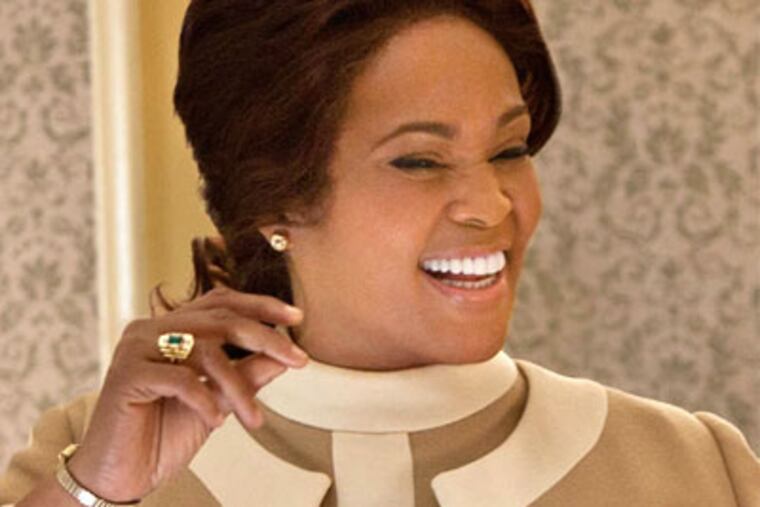'Sparkle': Whitney Houston's film finale
The remake of Sparkle, which shifts the action from 1950s Harlem to 1960s Detroit, is notable for many reasons, chief among them that it marks the last movie appearance of Whitney Houston. She plays Emma, the strict single mother of three daughters who make a splash as a Supremes-like trio.

The remake of Sparkle, which shifts the action from 1950s Harlem to 1960s Detroit, is notable for many reasons, chief among them that it marks the last movie appearance of Whitney Houston. She plays Emma, the strict single mother of three daughters who make a splash as a Supremes-like trio.
If you're like me, you'll lose it when Houston takes uneasy flight with "His Eye Is on the Sparrow."
And if you're like me, you'll wonder why, given the circumstances of Houston's untimely death in February, the filmmakers kept the scene in which Emma defends herself to the eldest daughter: "I passed out a couple of times, sure. But I never, ever laid in my own vomit. Was my life not enough of a cautionary tale to you?"
Forgive them their trespasses.
Directed by Salim Akil (maker of the sprightly Jumping the Broom) with an updated screenplay by his wife, Mara Brock Akil (TV's Girlfriends), Sparkle is a solid entertainment with a winning debut by Jordin Sparks in the title role.
The screenplay reframes Effie, maid to a mob family in the 1976 original, as Emma, a failed entertainer and born-again church lady. It reimagines her daughters Sparkle, Sister (Carmen Ejogo), and Dolores (Tika Sumpter) respectively as musician, material girl, and militant.
In the title role, Sparks, an American Idol winner, plays the middle sibling as the quiet one eclipsed by the frankly sexual Sister and the politically outspoken Dolores. Sparkle channels her feelings into lyrics that she is too modest to sing herself. As she puts it, "I'm no Diana or Aretha."
Thus Sister (sultry Ejogo, who steals the movie from Sparks just as shamelessly as Lonette McKee stole the original from Irene Cara) becomes the lead singer in their act, Sister and the Sisters.
Naturally the girls have to sneak out to perform at open-mike night, where Sparkle catches the eye of Stix (Derek Luke), a would-be promoter. It is Sister who catches the eye of everyone else.
The late Curtis Mayfield's soulful songs and Ruth Carter's kicky costumes provide the film with authentic period tone and texture. R. Kelly, the film's music consultant, supplied some new songs, including the ballad "One Wing," nicely delivered by Sparks. While the song is meant to be a poetic description of Sister's trying to rise above her limitations, one can't help but hear it as an elegy for Houston.
Where the original Sparkle was a ghetto melodrama with equal parts mob and music, the Akils have refashioned it into a saga of family rupture and reconciliation. The remake has as many scenes set in church as in nightclubs. Is it because Bishop T.D. Jakes is one of the film's producers that the church is presented as a most important musical venue?
The broad-stroke film succeeds in a cheer-the-hero, hiss-the-villain kind of way. Mike Epps radiates sinister charisma as Satin, a self-hating stand-up comedian. All too eager to make money by making blacks the butt of his jokes, Satin is the film's villain, more tormented than the standard drug dealer.
Akil's incident-filled movie often feels choppy, as though significant scenes had been cut. Its flow might have been smoother had songs advanced the plot instead of stopping the show.
In the end, I felt I had watched one star, Houston, dim as I watched another, Ejogo, born.EndText